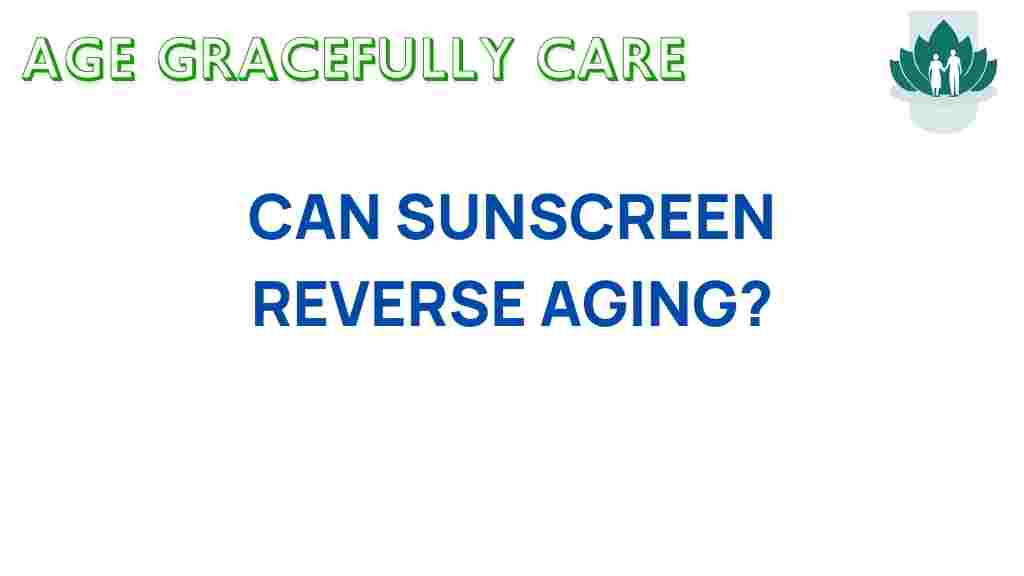Can Sunscreen Truly Reverse Aging? The Surprising Science Unveiled
In the realm of skincare, few products are as widely discussed as sunscreen. While traditionally viewed as a protective measure against sunburn and skin cancer, recent studies have begun to unveil its role in anti-aging. This article delves into the fascinating science behind sunscreen, exploring whether it can genuinely reverse the effects of aging on our skin.
Understanding the Science of Aging
Aging is a natural process that affects everyone, but how it manifests on our skin can differ significantly from person to person. Some visible signs of aging include:
- Wrinkles
- Fine lines
- Loss of elasticity
- Age spots
- Dullness
These changes are influenced by a variety of factors, including genetics, lifestyle choices, and, most importantly, sun exposure. The ultraviolet (UV) rays from the sun can cause significant damage to the skin, leading to premature aging.
The Role of Sunscreen in Skin Health
To understand how sunscreen can potentially reverse signs of aging, we must first comprehend its primary function: UV protection. Sunscreen works by absorbing, reflecting, or scattering UV radiation, thereby preventing it from penetrating the skin. This protective barrier is crucial for maintaining skin health and mitigating the effects of sun exposure.
How Sunscreen Works: The Science Explained
Sunscreen contains active ingredients that provide its protective benefits. These ingredients can be categorized into two main types:
- Physical (Mineral) Sunscreens: These contain zinc oxide or titanium dioxide, which sit on top of the skin and reflect UV rays.
- Chemical Sunscreens: These contain organic compounds that absorb UV radiation and convert it into heat, which is then released from the skin.
Both types of sunscreen are effective, but research suggests that physical sunscreens may offer additional benefits in terms of anti-aging properties.
Can Sunscreen Reverse Aging? The Evidence
Recent studies have indicated that consistent use of sunscreen may not just prevent further skin damage but could also contribute to skin repair and rejuvenation. Here are some key findings:
- Prevention of Photoaging: Regular sunscreen application has been shown to prevent photoaging, which is the premature aging of the skin caused by sun exposure.
- Improvement in Skin Texture: A study published in the Journal of Investigative Dermatology found that participants who used sunscreen daily exhibited improved skin texture and elasticity over time.
- Reduction of Hyperpigmentation: Sunscreen can significantly reduce the appearance of age spots and other forms of hyperpigmentation, contributing to a more youthful appearance.
These findings suggest that while sunscreen may not “reverse” aging in the traditional sense, it plays a crucial role in maintaining a youthful complexion and preventing the signs of aging from worsening.
Incorporating Sunscreen into Your Skincare Routine
For those looking to harness the anti-aging benefits of sunscreen, it’s essential to incorporate it correctly into your skincare regimen. Here’s a step-by-step process:
- Choose the Right Sunscreen: Look for a broad-spectrum sunscreen with an SPF of at least 30. Consider using a physical sunscreen for added anti-aging benefits.
- Apply Generously: Use about a nickel-sized amount for your face and more for other exposed areas. Ensure even coverage.
- Reapply Regularly: Sunscreen should be reapplied every two hours, or more frequently if swimming or sweating.
- Layer Your Products: Apply sunscreen as the last step in your morning skincare routine, after moisturizer and before makeup.
Common Misconceptions About Sunscreen
Despite its proven benefits, many myths about sunscreen persist. Here are some common misconceptions:
- “I don’t need sunscreen on cloudy days.” UV rays can penetrate clouds, so it’s essential to wear sunscreen even when it’s overcast.
- “My makeup contains sunscreen, so I don’t need to apply it separately.” While makeup with SPF offers some protection, it’s often not enough for full coverage. Always use dedicated sunscreen.
- “I have dark skin; I don’t need sunscreen.” While darker skin has more natural protection, it can still suffer from sun damage. Everyone should wear sunscreen.
Troubleshooting Tips for Sunscreen Use
Even with the best intentions, there can be issues with sunscreen application. Here are some troubleshooting tips:
- Irritation or Breakouts: If you experience irritation, opt for a fragrance-free or hypoallergenic sunscreen. Consider mineral-based options if chemical sunscreens cause issues.
- Greasy Residue: If you dislike the feel of sunscreen, look for gel-based or matte-finish options that absorb quickly.
- Staining Clothes: Allow sunscreen to dry before dressing to minimize staining.
Complementing Sunscreen with Other Anti-Aging Strategies
While sunscreen is a powerful tool in your anti-aging arsenal, it’s most effective when used in conjunction with other beauty secrets and strategies:
- Moisturize Daily: Keeping your skin hydrated helps maintain its elasticity and reduces the appearance of fine lines.
- Incorporate Antioxidants: Products containing vitamin C, E, and other antioxidants can help combat oxidative stress and enhance skin health.
- Healthy Lifestyle Choices: A balanced diet, regular exercise, and adequate sleep contribute significantly to skin health and overall aging.
Conclusion: The Future of Sunscreen in Anti-Aging
In conclusion, while sunscreen may not have the power to reverse aging outright, it is undeniably a critical element in the fight against premature aging. Its ability to protect the skin from harmful UV rays and promote overall skin health cannot be overstated. By integrating sunscreen into your daily routine and pairing it with other effective anti-aging strategies, you can enhance your skin’s appearance and longevity.
As science continues to evolve, the understanding of the benefits of sunscreen will only deepen, revealing even more about its role in maintaining youthful, healthy skin. So, the next time you reach for that bottle of sunscreen, remember that you are not just protecting your skin from the sun; you are also investing in its future health.
For more information on skincare and the science behind aging, explore our other articles on skincare tips and tricks.
This article is in the category Health and created by AgeGracefullyCare Team
